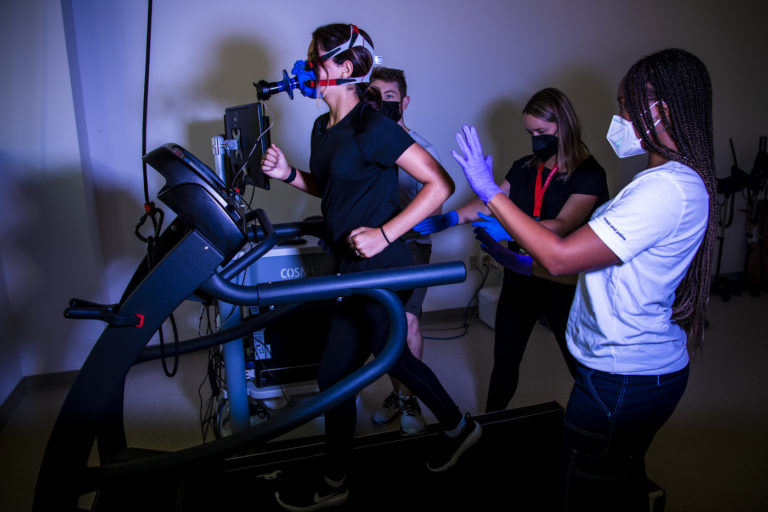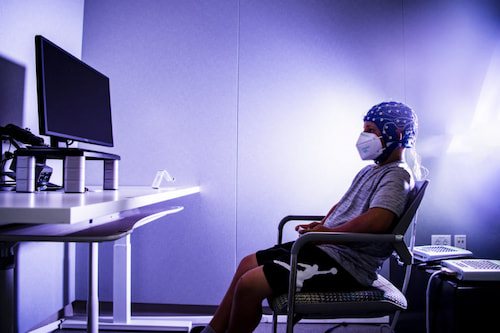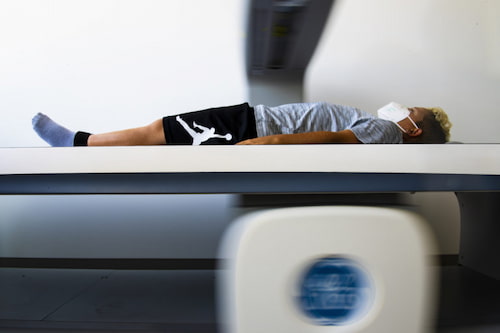Immediately before children in Naperville, Illinois, sit down to take standardized tests, they are routinely led on an invigorating walk outdoors.
The school district, which ranks among the top 40 in the U.S., recognizes that exercise improves intellectual performance, says Charles Hillman, a Northeastern professor of psychology and physical therapy, movement, and rehabilitation sciences, who serves as associate director of the Center for Cognitive and Brain Health.
Hillman’s research has found that children in general experience a jump in cognitive performance in the hour immediately following exercise.The exception to this rule is children with obesity, as affirmed by 2020 research. Among children ages 8 to 11, Hillman’s center found that those with a higher body mass index failed to realize a cognitive gain following 20 minutes of exercise on a treadmill.


“One of our long-term goals is to understand why there is that difference in how children respond,” says Lauren Raine, an assistant professor in the Department of Physical Therapy, Movement and Rehabilitation Sciences and the Department of Medical Sciences at the Center for Cognitive and Brain Health.
The short-term gains of exercise enable children of normal weight to perform better at multitasking, ignoring distractions in a classroom and setting aside thoughts to be applied later, such as when solving math problems.
What prevents children with obesity from enjoying the instant benefits of physical activity? Hillman’s team is focusing on the role played by visceral adipose tissue, the layers of fat that envelop the body’s organs. A 2018 study by Hillman and Raine showed that children with obesity had significantly lower performance on tests of reading and math, and that the deficiency was related to visceral fat.
“This is the fat that keeps your organs safe and warm,” Hillman says. “Some amount of visceral fat is important. But when it exceeds a certain amount, it becomes dangerous.”


Raine says that inflammation may be crucial to understanding the connection between visceral fat and cognitive performance. Does exercise inflame the adipose tissue?
“We know that increased fat is related to increased inflammation,” Raine says. “The thought is that because this ‘bad tissue’ surrounds the liver, it becomes much easier for these detrimental inflammatory markers to travel around the body, including the brain.”
While short-term exercise offers less cognitive gain for children with obesity, they benefit greatly from a long-term approach to fitness. A sustained nine-month program of exercise resulted in greater-than-normal cognitive gains for children with obesity, as shown by the center’s 2017 study.
“Weight loss is not the goal, because these children are still growing in height,” Raine says. “Unless they’re an extreme outlier case, most kids [with obesity] should be maintaining their weight as they grow.”


One of Raine’s goals is to come up with an exercise program that creates instant results for children with obesity.
Hillman’s team does their work at the center’s headquarters on the sixth floor of Northeastern’s Interdisciplinary Science and Engineering Complex, where children of all body types undergo a variety of physical and cognitive tests in pursuit of inter-relationships.
Children with obesity face numerous challenges. Deriving measures to support them in the short term may help inspire healthier long-term solutions.
“We know children with obesity have faced all sorts of barriers to being physically active,” Raine says. “If we can find out that children with obesity need to walk for 40 minutes at 50% of their heart rate to get the same benefit, wouldn’t it be better to recommend that to teachers and doctors? How do we actually give them something that they can use?”
Hillman’s team began publishing physical fitness and brain outcomes in children in 2005. Now the researchers are hoping to zero-in on a way to help a group of children realize the same gains as their peers.
“I would like to believe that acute exercise is good for everybody,” Raine says. “We just have to find the right starting spot.”
This post was originally published on News @ Northeastern by Ian Thomsen.




